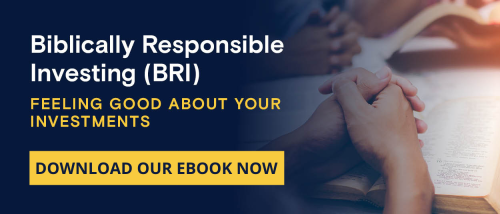If you are like most people, you spend time each month looking at your financial statements, but how often do you consider the impact of biblical values on your financial results?
As a San Antonio financial advisor focusing on faith-based financial planning, we facilitate the process of integrating BRI (Biblically Responsible Investing) into your financial plans and results. Think of this as putting your money where your beliefs are—quite literally.
It brings to mind the passage from Matthew [6:21], “For where your treasure is, there your heart will be also.” This passage underscores the intimate relationship between our material possessions and our spiritual well-being.
With BRI planning, you have the opportunity to align all or part of your invested assets with your core values, ensuring that your financial footprint is one you can be proud of, not just in this world but in the hereafter.
In this article, we’ll explore protection strategies, growth opportunities, and potential ways to insulate your portfolio against the bumpy economic conditions we’re witnessing in the U.S. economy and securities markets.
BRI Planning-Part of Your Spiritual Foundation
Using the analogy of building a house on a solid foundation of rock vs. sand, you can think of Biblically Responsible Investing (BRI) similarly. Using a BRI planning strategy, your financial foundation could be based on investing with companies that share the same ethical principles that align with yours to provide a strong moral foundation for your investment goals, process, and results.
In both scenarios, the groundwork matters. If you’re building a house, you certainly don’t compromise on the quality of materials or the skilled labor building the house. Similarly, BRI is about ensuring the core of your investment portfolio is built on principles that are not just financially sound but are also ethically and spiritually rich.
What the Bible Tells Us About Investing
The Bible guides us on financial matters, including principles related to investing. One notable verse that reflects the concept of prudent and wise investing can be found in the book of Proverbs:
“The wise store up choice food and olive oil, but fools gulp theirs down.”
Proverbs [21:20] (NIV)
This verse emphasizes the importance of prudence and foresight in managing our resources, including making wise investment choices. It underscores the value of saving and investing for the future rather than indulging in short-term consumption.
The Bible encourages us to exercise wisdom in financial matters, including investments, by planning for the future and making choices that promote long-term financial well-being and the well-being of others.
Should You Invest in BRI Mutual Funds and ETFs?
While you can invest directly in companies that you support through stock purchases, another way you can introduce BRI investing into your portfolio is through BRI mutual funds and Exchange-Traded Funds (ETFs).
These funds typically avoid investing in companies involved in activities that conflict with biblical principles, such as gambling, alcohol, tobacco, birth control, or companies with questionable labor practices.
You should vet these funds or have a professional do it for you to ensure their investments are aligned with your beliefs and values. This can be done by reviewing their prospectus and researching their holdings.
It’s also important to review the fund’s historical performance and ensure you understand the fully loaded costs of the funds’ services. You may want to rely on a San Antonio CERTIFIED FINANCIAL PLANNER™ for this information.
“Trust in the Lord with all your heart and lean not on your understanding; in all your ways, submit to him, and he will make your paths straight.” Proverbs 3:5-6 (NIV)
Understanding BRI Mutual Funds and ETF Fees
As noted, before investing in any fund or portfolio, BRI or not, it’s important to understand how the fund is compensated. You are seeking full disclosure by the fund to make an informed decision.
- BRI mutual funds and ETFs typically charge a management fee for overseeing the fund’s portfolio. This fee is expressed as a percentage of your total investment and covers the costs of research, portfolio management, and administration. It’s essential to know the management fee’s total impact on your investment returns.
- Expense Ratio: The expense ratio includes various costs associated with running the fund, such as administrative, marketing, and operational costs. This ratio is also a percentage and directly affects your invested capital’s net returns.
- Load Fees: Some mutual funds charge load fees, essentially sales charges. These fees can be front-end (charged when you buy shares) or back-end (charged when you sell shares). Investigate whether your chosen BRI fund imposes load fees and how they are applied.
- Trading Costs: ETFs, being traded on the stock exchange, may have brokerage commissions associated with the buying and selling of shares. These costs can add up, impacting your net returns over longer periods.
- Performance and Impact on Returns: It’s crucial to assess the historical performance of BRI funds and their fees. Remember that lower fees don’t guarantee higher returns, but minimizing expenses can impact the net returns of your investments. High fees do not guarantee better returns, and low fees do not guarantee improved net returns.
Using the Services of a San Antonio Certified Kingdom Advisor
Many individuals use the services of San Antonio financial advisors who carry the Certified Kingdom Advisor (CKA) designation.
What is a Certified Kingdom Advisor (CKA)?
This financial certification was created for financial professionals who serve clients of the Christian faith and integrate a values-based investment approach into their practices.
The training curriculum blends foundational financial advising skills with Biblical teachings, creating a harmonious blend of spiritual and financial guidance.
The CKA certification process is focused on equipping financial professionals with the skills to offer ‘biblically wise’ financial counsel.
How to Start Your BRI Journey?
If you want to blend your financial decisions with your spiritual values, consider BRI planning. This is more than just managing your assets; it’s about being a good steward of your wealth in a manner that pays homage to the ultimate Source of all blessings.

